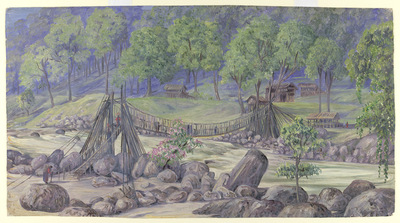Javascript must be enabled to continue!
'Cane bridge over the Rungheet. Darjeeling. India. October 1878'
View through Europeana Collections
Oil painting on paper by Marianne North of the
cane bridge over the Rungeet river at Darjeeling, dated October
1878. Marianne North visited India in 1877-79 and completed over
200 paintings whilst there. In her autobiography, 'Recollections of
a happy life' of 1892, she wrote, "The famous meeting of the waters
is more like English scenery than Indian, and that is the true
reason why Anglo-Indians always rave about it. The river rushes on
like a whirpool, and the night air is delicious. It made a pretty
moonlight scene, with the men round the fire for a foreground. The
most picturesque thing down there was a swing-bridge made of canes
and rattan, rather higher up the Rungheer. At a distance it looked
like a slice of spider's web. I got a sketch of it from two
different points. All the ends of the rattan webbing were fastened
to different boulder-stones and trees. The bridge was reached by a
crazy ladder, and required some nerve to walk over, as the footway
was very transparent and loosely put together."
Title: 'Cane bridge over the Rungheet. Darjeeling. India. October
1878'
Description:
Oil painting on paper by Marianne North of the
cane bridge over the Rungeet river at Darjeeling, dated October
1878.
Marianne North visited India in 1877-79 and completed over
200 paintings whilst there.
In her autobiography, 'Recollections of
a happy life' of 1892, she wrote, "The famous meeting of the waters
is more like English scenery than Indian, and that is the true
reason why Anglo-Indians always rave about it.
The river rushes on
like a whirpool, and the night air is delicious.
It made a pretty
moonlight scene, with the men round the fire for a foreground.
The
most picturesque thing down there was a swing-bridge made of canes
and rattan, rather higher up the Rungheer.
At a distance it looked
like a slice of spider's web.
I got a sketch of it from two
different points.
All the ends of the rattan webbing were fastened
to different boulder-stones and trees.
The bridge was reached by a
crazy ladder, and required some nerve to walk over, as the footway
was very transparent and loosely put together.
".
Related Results
Illustration, Carlisle Bridge, Co. Dublin, Ireland
Illustration, Carlisle Bridge, Co. Dublin, Ireland
Lantern slide of an illustration of Carlisle Bridge (now known as O'Connell Bridge) Co. Dublin. Originally catalogued with label 'D3VII 93.' Depicts an illustration of Carlisle B...
Illustration, Barracks Bridge and Queen's Bridge, Co. Dublin, Ireland
Illustration, Barracks Bridge and Queen's Bridge, Co. Dublin, Ireland
Lantern slide of an illustration of Queen's Bridge (now know as Liam Mellow's Bridge, Dublin) and the Barracks Bridge (now Rory O'More Bridge), Co. Dublin. Originally catalogued ...
Porcelain cane handle, painted in underglaze blue, made by Saint-Cloud porcelain factory, France, about 1700-1750. Porcelain cane handle with lobed bulbous knop, painted with formal ornament and the end with a cut sprig in underglaze blue. Soft-paste por
Porcelain cane handle, painted in underglaze blue, made by Saint-Cloud porcelain factory, France, about 1700-1750. Porcelain cane handle with lobed bulbous knop, painted with formal ornament and the end with a cut sprig in underglaze blue. Soft-paste por
Porcelain cane handle, painted in underglaze blue, made by Saint-Cloud porcelain factory, France, about 1700-1750. Porcelain cane handle with lobed bulbous knop, painted with forma...
Cane handle, porcelain, painted in underglaze blue, Saint-Cloud porcelain factory, France, about 1700-1750. Cane handle, porcelain, painted in underglaze blue. Plain bulbous knop, painted with formal ornament and the end with a cut sprig. Soft-paste porc
Cane handle, porcelain, painted in underglaze blue, Saint-Cloud porcelain factory, France, about 1700-1750. Cane handle, porcelain, painted in underglaze blue. Plain bulbous knop, painted with formal ornament and the end with a cut sprig. Soft-paste porc
Cane handle, porcelain, painted in underglaze blue, Saint-Cloud porcelain factory, France, about 1700-1750. Cane handle, porcelain, painted in underglaze blue. Plain bulbous knop, ...
Illustration, Grattan Bridge, Co. Dublin, Ireland
Illustration, Grattan Bridge, Co. Dublin, Ireland
Lantern slide of an illustration of Grattan Bridge ( known historically as Essex Bridge) Co. Dublin. Originally catalogued with labels 'D3VII 95' and 'Old Dublin. Old Essex Bridge...
Winch Bridge, Durham, in Hutchinsons Tour
Winch Bridge, Durham, in Hutchinsons Tour
View of the Winch Bridge across a rocky gorge
above the River Tees in County Durham. William Hutchinson,
antiquarian of Durham, wrote on the antiquaries or County Durham in
1785-17...
New Bridge, Exeter
New Bridge, Exeter
View of Exeter showing the 'New Bridge' over the
River Exe and houses either side. During the Middle Ages, Exeter
had a single bridge to serve the town. It was constantly damaged
a...
Illustration, Grattan Bridge, Co. Dublin, Ireland
Illustration, Grattan Bridge, Co. Dublin, Ireland
Lantern slide of an illustration of Grattan Bridge ( known historically as Essex Bridge) Co. Dublin. Originally catalogued with label 'D3VII 97.' Depicts an illustration of the b...



